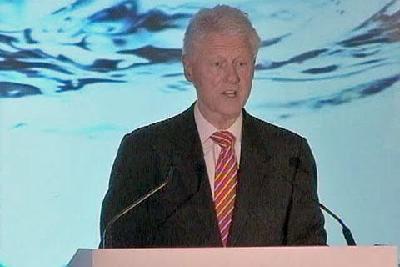About one billion people on earth do not have access to adequate or clean water supplies. More people die each year of water-borne illnesses, such as dysentery and cholera, than are killed in wars. To address this humanitarian and public health crisis, one of New York's leading business schools conducted an international student competition on ways to bring clean water to some of the world's most impoverished places.

The Hult International Business School teamed up with Water.org, a non-governmental advocacy group, to challenge the world's business students to find a way of bringing clean water to 100 million people in the next five years.
Teams from six universities, out of more than 1,000 that applied, reached the competition's final round in New York City. The winning team, Britain's Cambridge University, noted in its presentation that among those at the very bottom of the global economic pyramid - the world's poorest populations - cell phones are more common than toilets.
Team member Akanksha Hazari said, "We're going to tie the ongoing and accelerating behavior of mobile phone usage at the bottom of the pyramid to something communities really care about: water and sanitation infrastructure."
Hult's $1-million prize to the Cambridge team should help that effort, as will support from Water.org and the Clinton Global Initiative, a development fund created by former US President Bill Clinton.
Mr. Clinton praised all the Hult competition finalists for offering practical solutions. "The most important question of the 21st century," said the former president, "is How?"
"The reason we're having a prize tonight, which is, whatever you propose to do and however you propose to do it, with whatever much money you have; just exactly how are you going to do it? How are you going to turn your good intentions into real changes?"
Akanksha Hazari explained. "Well first, we need to set up the infrastructure. And we're going to do this by leveraging the existing water credit 2.0 platform, where women self-help groups take out water sanitation loans from microfinance institutions. They use these loans to build water and sanitation infrastructure through a local NGO partner."
Hazari says the second part involves partnering with local telecommunication companies by creating so-called "corporate loyalty" programs. When residents use a cell phone, they earn points with their service provider. Those points translate into cash equivalents that are returned to the community to fund water sanitation projects.
Gary White, founder and executive director of Water.org, told VOA that philanthropy is important to this process, but it's not enough.
"I think we need new types of capital coming into the space," he said. "There's never going to be enough charity alone to do this, and charity solutions aren't always scalable. So if we can leverage more commercial capital in this space that would be a great start."
Hult's administrators and professors say the winning Cambridge University model shows how engaging the business community to address a serious social problem is a win-win situation. By channeling capital for water projects into poor communities, the telcom companies not only address this urgent human need, but they also expand their customer base and boost their profits.
philanthropy: the practice of helping the poor and those in need, especially by giving money 博愛;慈善;樂善好施
US restaurant patrons pay one for normally-free tap water
Safe water project fails to quench countryside thirst
(來源:VOA 編輯:崔旭燕)
